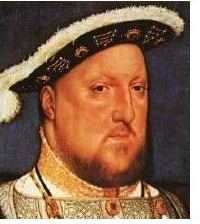Henry VIII
King of England and founder of the Church of England, b. 28 June 1491 (Greenwich, England), d. 28 January 1547 (London).
 Henry VIII was the second son of Henry VII, the first king of the Tudor dynasty, and his wife Elizabeth. Henry's elder brother Arthur died in 1502, so Henry could expect to become king when he was nine years old. Ten years later he began his first military adventure, in support of Ferdinand of Aragon and the pope against France.
Henry VIII was the second son of Henry VII, the first king of the Tudor dynasty, and his wife Elizabeth. Henry's elder brother Arthur died in 1502, so Henry could expect to become king when he was nine years old. Ten years later he began his first military adventure, in support of Ferdinand of Aragon and the pope against France.
Henry VIII was an ordinary king in most respects. For over a decade he left politics mostly to his first minister Cardinal Wolsey, and England was ruled on Catholic principles. The country's importance on the European scene declined in proportion to the rise of the Holy Roman Emperor Charles V, who ruled from Spain to the Netherlands, across Germany to Austria, into Italy south to Naples, and to South America. Based on his administrative and government achievements Henry VIII would not rate a major mention in history.
The situation changed in 1527 when Henry decided to divorce his wife Catherine, who had had several stillbirths and early child deaths; the only surviving child, born in 1516, was a girl and thus not fit in Henry's eyes to become successor to the throne.
Divorce was not an option for Catholics, so Henry appealed to the pope to have his marriage annulled, arguing that he was living in sin since Catherine was his brother's widow. To marry one's brother's widow was indeed against biblical teaching, but the pope, who was more within reach of the powers of Charles V than the power of Henry VIII, proved reluctant to agree to the annulment. (The fact that Henry had previously received papal consent to marry his brother's widow was of course not helping his case.)
In 1532, after five years of indecision, Henry concluded that the only way to a divorce was through separation of the English church from Rome. He created the Church of England as a religious department of the state with the king as its Head. The new archbishop of the new church declared Henry's marriage annulled, and Henry married Anne Boleyn in 1533.
Henry found it difficult to define the religious content of a church that was created solely to allow him a second marriage. Ten years earlier, in 1521, he had written a strong attack on Luther through his book Assertio septem sacramentorum adversus Martinum Lutherum, for which the pope had given him the title "Defender of the Faith." In 1533 he was excommunicated, and his Church of England looked very much like Protestant reformation. In the end Henry devised an amalgam of Catholic tradition - such as the celibacy of priests - with the Protestant teaching that salvation can be found through faith without the help of priests.
More serious were his matrimonial problems. Queen Anne (the mother of Queen Elizabeth I) had failed to produce the male heir, so in 1536 she was falsely accused of adultery and executed, along with other members of the court, to make way for Jane Seymour, who bore Henry his son Edward in 1537 but died in childbirth.
The last decade of Henry's life saw his mental and physical decline. It did not restrain him from entering into three more marriages and having not only his fifth wife executed but his first minister as well. In 1542 he started another war against France that nearly ruined the country; only the selling off of lands, previously owned by monasteries and turned into crown property during the separation from the Catholic church, rescued the state finances.
home
 Henry VIII was the second son of Henry VII, the first king of the Tudor dynasty, and his wife Elizabeth. Henry's elder brother Arthur died in 1502, so Henry could expect to become king when he was nine years old. Ten years later he began his first military adventure, in support of Ferdinand of Aragon and the pope against France.
Henry VIII was the second son of Henry VII, the first king of the Tudor dynasty, and his wife Elizabeth. Henry's elder brother Arthur died in 1502, so Henry could expect to become king when he was nine years old. Ten years later he began his first military adventure, in support of Ferdinand of Aragon and the pope against France.